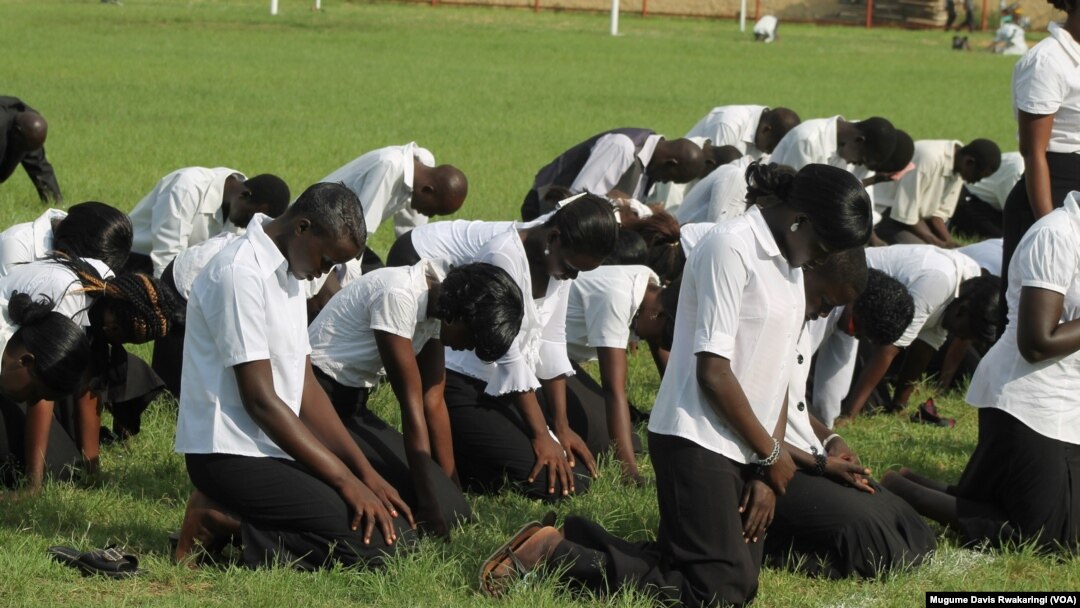JUBA, SOUTH SUDAN —
Thousands of South Sudanese gathered in stadiums across the country to pray for the world's newest nation ahead of celebrations on Tuesday to mark two years of independence, and to try to heal the still painful wounds left by decades of war.
“Today is a good day for us as South Sudanese because it is a day for reconciliation and peace. We enjoyed these prayers, because they gather all the churches, all the government officials, all the communities," said Jenty Bangafu, one of hundreds of people who sang hymns and danced in Yambio’s Gbudue Stadium during a prayer ceremony on Monday.
The event in Yambio was part of a national day of prayer, organized by South Sudan's Committee of National Healing, Peace and Reconciliation. The committee was set up by President Salva Kiir to promote forgiveness and try to end rebellions and the outbreaks of violence that still plague the country, such as deadly cattle raids.
In Eastern Equatoria, the day of prayer was turned into a week of prayer. Torit's Episcopal Bishop Bernard Oringa Bamloi said the national day of prayer was a good first step in the healing process, but warned that South Sudan still has a long way to go.
In Juba, where the main prayer event was held, Joshua Peter Aggrey arrived at the stadium hours early. A Muslim, he said he came to the prayer ceremony to show the country’s leaders that all denominations support reconciliation efforts.
“As Southern Sudanese, we respect our leaders and we listen to them. We pray that God may lead them in a way that this nation shall be successful,” he said.
The national day of prayer was a first step in efforts to address violence that has flared in South Sudan in the past two years, said Episcopal Church of Sudan Pastor Emmanuel Natanie, a member of the national reconciliation committee.
“If we pray as a church, then we are sure that God will penetrate our communities and soften the hearts of people as we begin the process of healing and reconciliation of our republic. Something good will come,” he said.
The reconciliation committee is due to visit communities around South Sudan to gather feedback on what the government should do to promote peace and reconciliation in the country, Natanie said.
South Sudanese voted overwhelmingly in a referendum in January 2011 to break away from Sudan, and on July 9 of that year became the world's newest nation.
The referendum was a key condition of the 2005 comprehensive peace agreement that ended more than two decades of civil war in Sudan.
“Today is a good day for us as South Sudanese because it is a day for reconciliation and peace. We enjoyed these prayers, because they gather all the churches, all the government officials, all the communities," said Jenty Bangafu, one of hundreds of people who sang hymns and danced in Yambio’s Gbudue Stadium during a prayer ceremony on Monday.
The event in Yambio was part of a national day of prayer, organized by South Sudan's Committee of National Healing, Peace and Reconciliation. The committee was set up by President Salva Kiir to promote forgiveness and try to end rebellions and the outbreaks of violence that still plague the country, such as deadly cattle raids.
In Eastern Equatoria, the day of prayer was turned into a week of prayer. Torit's Episcopal Bishop Bernard Oringa Bamloi said the national day of prayer was a good first step in the healing process, but warned that South Sudan still has a long way to go.
In Juba, where the main prayer event was held, Joshua Peter Aggrey arrived at the stadium hours early. A Muslim, he said he came to the prayer ceremony to show the country’s leaders that all denominations support reconciliation efforts.
“As Southern Sudanese, we respect our leaders and we listen to them. We pray that God may lead them in a way that this nation shall be successful,” he said.
The national day of prayer was a first step in efforts to address violence that has flared in South Sudan in the past two years, said Episcopal Church of Sudan Pastor Emmanuel Natanie, a member of the national reconciliation committee.
“If we pray as a church, then we are sure that God will penetrate our communities and soften the hearts of people as we begin the process of healing and reconciliation of our republic. Something good will come,” he said.
The reconciliation committee is due to visit communities around South Sudan to gather feedback on what the government should do to promote peace and reconciliation in the country, Natanie said.
South Sudanese voted overwhelmingly in a referendum in January 2011 to break away from Sudan, and on July 9 of that year became the world's newest nation.
The referendum was a key condition of the 2005 comprehensive peace agreement that ended more than two decades of civil war in Sudan.


